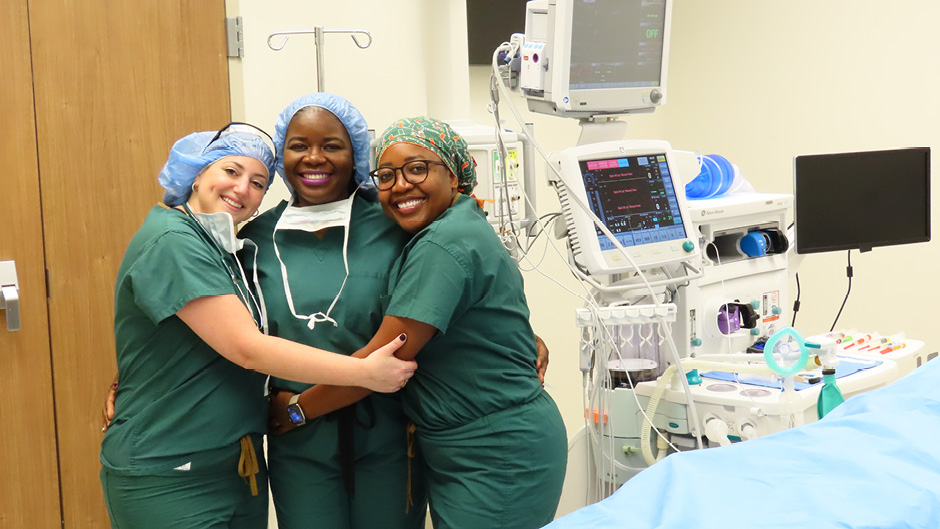When Jennifer Robbins moved to Florida to begin the rigorous Bachelor of Science in Nursing (BSN)-Doctor of Nursing Practice (DNP) Nurse Anesthesia Track program at the University of Miami’s School of Nursing and Health Studies (SONHS), she left her friends, family, and comfortable life behind. Robbins was ready to make personal sacrifices to pursue her dream of becoming a Certified Registered Nurse Anesthetist (CRNA). But she knew she’d need extra support to thrive, and was thrilled when she found it in an unexpected place—the School’s innovative Transition to Clinicals peer mentorship program.
“CRNA school is incredibly stressful,” said Robbins. “For people like me who moved here alone from out of state, it’s easy to isolate yourself. Mentors help us feel less alone and see that the program is achievable.”
Robbins was matched with Akudo Ekeke, an advanced student who had volunteered to mentor two incoming students through their crucial first year and beyond.
“As a nursing leader, it’s my responsibility to provide students with an excellent mentoring experience,” said Ekeke. “Academic expectations in the CRNA program can be quite intimidating. The mentorship initiative guides students and provides ongoing support for a smoother transition.”
The BSN-DNP Nurse Anesthesia track is a 9-semester, full-time, entry-to-practice doctoral program that prepares students to become advanced practice providers in anesthesia. Because the program can be uniquely stressful and demanding, the School’s Nurse Anesthesia Students Association created the Transition to Clinicals program in 2018 to provide first-year students with a supportive peer mentoring experience and to encourage students to engage and connect across all years.
“The idea was to build an inclusive community that new students could lean on for academic and collegial support,” said SONHS assistant professor of clinical and associate director of the Nurse Anesthesia Track program Nicole Gonzaga Gomez, DNP, CRNA, APRN, CHSE. “Incoming students are entering a competitive doctoral program with a reputation for clinical excellence. The mentorship provides a more relaxed environment for them to learn from advanced students.”
“The mentors help us realize it’s not about competing with classmates or comparing your progress to theirs,” Robbins explained. “Akudo empowered me to have confidence in my knowledge and abilities, but to know it’s okay to make mistakes—nobody knows it all!”
The student-driven program pairs new students with volunteer second- and third-year mentors who provide encouragement and support through informal academic and social activities: "from talking about a bad day during a clinical rotation, to tips on how to study, to just hanging out for brunch or going on road trips,” said Ekeke.
“We discussed professors, courses, clinical sites, and helpful resources,” Robbins recalled. “She shared lessons learned and advice on care plans, case tips, Typhon logs, preceptor quirks and clinical site intricacies—she helped prepare me for it all.”
“From the get-go Akudo told me ‘I'm a call or text away’ and she has never failed me,” said Sharon Musekiwa, who was also mentored by Ekeke. “In class I might not get the concepts, but she explained them in ways I could understand. During our simulation experiences at S.H.A.R.E.® [the School’s Simulation Hospital Advancing Research and Education] I was so anxious, but she made it easy—like the equipment setup and intubation. That changed everything for me.”
Providing students with peer mentoring appears to be having a positive impact on their successful completion of the CRNA program. The BSN-DNP Nurse Anesthesia Track 2021 and 2022 graduates, who completed their studies with the support of the Transition to Clinicals program, achieved an impressive overall pass rate of 100% on the National Board Certification Exam.
But the program’s effects aren’t limited to academic achievements. Now serving its third cohort of students, the program has seen mentoring relationships evolve into lasting friendships. Increased wellbeing among the students is evident.
“Those who choose and utilize the mentorship are more balanced, focused, and successful,” said Gonzaga Gomez. Before Transition to Clinicals, students felt isolated, with limited communication between students from different cohorts. “With the implementation of this program, camaraderie has grown and enduring professional and personal relationships have been developed and strengthened. I see less anxiety and stress in those who have healthy and productive relationships with peers from other classes.”
Whether participating as mentors or mentees, the students wholeheartedly agree that Transition to Clinicals has been transformational.
“As a mentor, I’m able to build confidence, to realize I have unique knowledge that’s valuable to others,” said Ekeke. “I’m introverted by nature, and mentoring has allowed me to be more engaged and to demonstrate my leadership.”
“As someone educated outside of the U.S., I really needed guidance,” Musekiwa recalled. “Having a mentor made me free. I'm able to talk openly to anyone from any class, because Akudo has shown me how important it is to be reachable to everyone.”
“Having Akudo as my mentor has been such a comfort,” Robbins added. “I wouldn’t have made it this far without her—I know she has my back, and that’s an awesome feeling.”
And not only is Transition to Clinicals a game-changer, it’s self-perpetuating: once they advance into their second year, the grateful students are eager to give back by taking on their own mentees.
“I know how it feels to be clueless and lost in a new environment,” said Musekiwa. “I want to pay it forward by helping other students so they feel they have support whenever they need it.”

